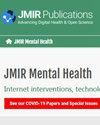患者对人工智能心理健康护理的看法:横断面调查研究
IF 4.8
2区 医学
Q1 PSYCHIATRY
引用次数: 0
摘要
背景:人工智能(AI)在健康和医疗保健领域的应用正在迅速增加。有几项研究对医疗专业人员的态度进行了评估,但对患者或公众的观点进行探讨的研究则少得多。调查患者观点的研究主要集中在躯体问题上,包括与放射学、围产期保健和一般应用相关的问题。在开发特定的心理健康护理解决方案时,曾征求过患者的反馈意见,但对心理健康护理方面的人工智能的更广泛视角的研究却很少。研究目的本研究旨在了解公众对人工智能潜在益处的看法、对人工智能的担忧、对人工智能完成各种任务的舒适度以及与人工智能相关的价值观,所有这些都与心理健康护理有关。调查方法我们对具有全国代表性的 500 名美国成年人进行了一次横断面调查。参与者就他们认为人工智能在心理健康护理方面的益处、担忧、舒适度和价值观提供了结构化的回答。他们还可以添加自由文本回答来阐述他们的担忧和价值观。结果:大多数参与者(245/497,49.3%)认为人工智能可能有益于心理健康护理,但这一观点因社会人口变量的不同而有所差异(均为 P<.05)。具体而言,黑人参与者(几率比[OR] 1.76,95% CI 1.03-3.05)和健康素养较低者(OR 2.16,95% CI 1.29-3.78)认为人工智能更有益,而女性(OR 0.68,95% CI 0.46-0.99)认为人工智能较无益。参与者对人工智能的准确性、可能出现的意外后果(如误诊)、信息的保密性以及在使用人工智能进行心理健康护理时与医疗专业人员失去联系等问题表示担忧。大多数参与者(80.4%,402/500)认为,在使用人工智能进行心理健康护理时,能够了解导致其风险的个人因素、保密性和自主性是非常重要的。当被问及谁应对使用人工智能误诊精神疾病负责时,81.6%(408/500)的参与者认为医疗专业人员应对此负责。定性结果显示了与人工智能的准确性有关的类似担忧,以及使用人工智能可能对患者信息保密性造成的影响。结论未来涉及使用人工智能进行心理健康护理的工作应研究传达人工智能准确性水平的策略、导致患者心理健康风险的因素以及如何保密使用数据,以便患者能与他们的医疗专业人员一起确定人工智能何时可能有益。同样重要的是,在使用人工智能时,要确保患者与医疗专业人员之间的关系得到维护。本文章由计算机程序翻译,如有差异,请以英文原文为准。
Patient Perspectives on AI for Mental Health Care: Cross-Sectional Survey Study
Background: The application of artificial intelligence (AI) to health and health care is rapidly increasing. Several studies have assessed the attitudes of health professionals, but far fewer studies have explored the perspectives of patients or the general public. Studies investigating patient perspectives have focused on somatic issues, including those related to radiology, perinatal health, and general applications. Patient feedback has been elicited in the development of specific mental health care solutions, but broader perspectives toward AI for mental health care have been underexplored. Objective: This study aims to understand public perceptions regarding potential benefits of AI, concerns about AI, comfort with AI accomplishing various tasks, and values related to AI, all pertaining to mental health care. Methods: We conducted a 1-time cross-sectional survey with a nationally representative sample of 500 US-based adults. Participants provided structured responses on their perceived benefits, concerns, comfort, and values regarding AI for mental health care. They could also add free-text responses to elaborate on their concerns and values. Results: A plurality of participants (245/497, 49.3%) believed AI may be beneficial for mental health care, but this perspective differed based on sociodemographic variables (all P<.05). Specifically, Black participants (odds ratio [OR] 1.76, 95% CI 1.03-3.05) and those with lower health literacy (OR 2.16, 95% CI 1.29-3.78) perceived AI to be more beneficial, and women (OR 0.68, 95% CI 0.46-0.99) perceived AI to be less beneficial. Participants endorsed concerns about accuracy, possible unintended consequences such as misdiagnosis, the confidentiality of their information, and the loss of connection with their health professional when AI is used for mental health care. A majority of participants (80.4%, 402/500) valued being able to understand individual factors driving their risk, confidentiality, and autonomy as it pertained to the use of AI for their mental health. When asked who was responsible for the misdiagnosis of mental health conditions using AI, 81.6% (408/500) of participants found the health professional to be responsible. Qualitative results revealed similar concerns related to the accuracy of AI and how its use may impact the confidentiality of patients’ information. Conclusions: Future work involving the use of AI for mental health care should investigate strategies for conveying the level of AI’s accuracy, factors that drive patients’ mental health risks, and how data are used confidentially so that patients can determine with their health professionals when AI may be beneficial. It will also be important in a mental health care context to ensure the patient–health professional relationship is preserved when AI is used.
求助全文
通过发布文献求助,成功后即可免费获取论文全文。
去求助
来源期刊

Jmir Mental Health
Medicine-Psychiatry and Mental Health
CiteScore
10.80
自引率
3.80%
发文量
104
审稿时长
16 weeks
期刊介绍:
JMIR Mental Health (JMH, ISSN 2368-7959) is a PubMed-indexed, peer-reviewed sister journal of JMIR, the leading eHealth journal (Impact Factor 2016: 5.175).
JMIR Mental Health focusses on digital health and Internet interventions, technologies and electronic innovations (software and hardware) for mental health, addictions, online counselling and behaviour change. This includes formative evaluation and system descriptions, theoretical papers, review papers, viewpoint/vision papers, and rigorous evaluations.
 求助内容:
求助内容: 应助结果提醒方式:
应助结果提醒方式:


